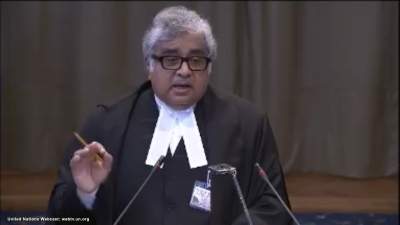New Delhi (IANS) Senior advocate Harish Salve on Thursday told the Supreme Court that ministers or those holding high office should exercise restraint while making statements in the public domain.
The apex court had appointed two senior advocates – Salve and Fali Nariman – to assist it as amici curiae to examine whether elected representatives and politicians can be restrained from making statements on pending criminal matters and, if they do, would it be tantamount to curbing the fundamental right of free speech.
A five-judge bench headed by Justice Arun Mishra and comprising Justices Indira Banerjee, Vineet Saran, M.R. Shah and Ravindra Bhat, is hearing the matter.
On the second day of the hearing, Salve emphasised ministers and others holding high offices should refrain from making random statements, which may reflect on the business of the government and then claiming protection under free speech.
He told the court that the office imposes responsibility on the minister to exercise restraint while making any statement in public.
As the court asked how could one handle such a situation which imposes restraint on the minister, Salve said they should not comment on any issue other than those connected with administration and a public functionary should not give any opinion, which may affect the government.
Salve also cited the menace of social media, especially to the right to privacy. He cited the case of Facebook and WhatApp users, who often have apprehensions on the aspect of privacy on the social platform. “Today, non-state entities exercise far greater control and private companies control a major part of public infrastructure. In the US, private companies run cities… even in this scenario, the state has to protect the right of privacy,” he contended.
One of the judges on the bench then cited the case of author Salman Rushdie, who wrote something which was considered objectionable to the Islamic world. “Death threats followed, and then he was given security. He could have probably faced threats from vigilante groups, or a common man can face from private corporation… in this scenario isn’t the state required to restrict persons’ rights?” the judge queried.
Attorney General K.K. Venugopal had said the court must examine whether the state’s power, under Article 19 (2) of the Constitution, to impose reasonable restrictions could be expanded.
Venugopal had posed important questions before the bench, including “Should ministers in position of power restrict their right to free speech, especially in a sensitive trial?”, and “Can restriction be introduced on people holding high positions?”
He reckoned that restrictions can be imposed through a separate statutory provision. Alternatively, the aggrieved person can file a defamation suit, he inisisted.
The issue has cropped up after Azam Khan, then minister of the Samajwadi Party government in Uttar Pradesh, claimed in 2017 that the July 28, 2016 gang rape of a woman and her teenage daughter in the state’s Bulandshahr district was “politically motivated”. The family, aggrieved by this statement, moved the top court in 2017 alleging these comments have prejudiced the case, which was later transferred to the CBI.

